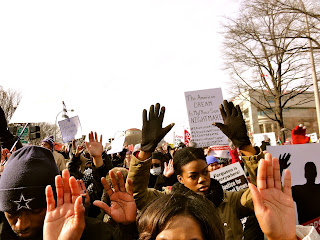Several times before I've discussed the topic of social media and how it can be used for the positive and the negative. The positive is found in the ability to give voice to the often voiceless especially in countries where medias stay controlled. In other places like Iraq, groups like ISIS have a global reach in multiple languages by manipulating the demographics of social media's key users, often young people.
 |
| Photo Credit: 2015 Deutsche Welle |
However, there is another value in social media that is less often discussed. Its value as a data collection hub and tracking tool. In nations like Nepal and Japan it an be used to monitor aid need for natural disasters. In America - aside from some of the more social uses - it can be used to track political upheavals. Social media is even used as a tool for monitoring terrorism.
 |
| Photo: Black Lives Matter #DCFerguson Protest in Washington DC. Photo Credit: Katie A. Paul, 2014 |
Egypt for instance, has become a hub of technology in the Middle East. Millions of dollars from United Arab emirates have been poured into technology in Egypt making it one of the most wired countries in both the Middle East and Africa. Twitter and Facebook became famous in Egypt during the Arab Spring for their role in not only creating a gathering platform, but in sharing and revealing information that was not privy to the presses once the regime cracked down on the media and on TV and Internet output. Social media was used as a tool for the voiceless as was discussed in a previous post about 21st century freedom fighter.
 |
| Photo: Katie Paul attending #DCFerguson protest at Capitol. |
Egyptians are not alone in their use of social media for socio-political change. In recent months, there has been a flurry of activity across the United States regarding the use of excessive force by the police in cities across the nation. I was able to participate in more than one of the #BlackLivesMatter protests as a result of following the information by protest organizers on social media.
Social media has gone far beyond the social and launched a society whose history and movements are forever digitally recorded in archives of the Internet.
Additional Reading: